Over 30 years of anarchist writing from Ireland listed under hundreds of topics
International
Black Flame and the anarchist tradition - review
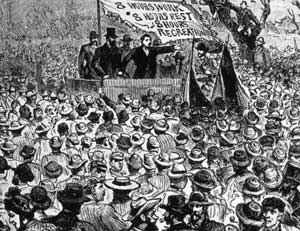 This new history of anarchism provides a thorough and approachable examination of the tradition’s key ideas, debates and strategies, placing them in the context of the social struggles in which they arose. Anarchism is not blessed with the most attractive of brand names. While dictionaries and news media alike have successfully associated it with disorder and chaos, the anarchist political pantheon itself seems to share these traits; anarchism is label to both capitalists and communists, radical individualists and revolutionary socialists.What can ‘anarcho-capitalists’ such as Murray Rothbard have in common with revolutionaries such as Mikhail Bakunin and Piotr Kropotkin? Even the latter, among the most important of the movement’s theorists, himself claimed that anarchism’s political pedigree stretched back as far as Ancient Greek philosopher Xeno and Lao Tzu, the originator of Taoism. If one tries to and accommodate such a diversity of personas under this single term, the word loses all meaning.
This new history of anarchism provides a thorough and approachable examination of the tradition’s key ideas, debates and strategies, placing them in the context of the social struggles in which they arose. Anarchism is not blessed with the most attractive of brand names. While dictionaries and news media alike have successfully associated it with disorder and chaos, the anarchist political pantheon itself seems to share these traits; anarchism is label to both capitalists and communists, radical individualists and revolutionary socialists.What can ‘anarcho-capitalists’ such as Murray Rothbard have in common with revolutionaries such as Mikhail Bakunin and Piotr Kropotkin? Even the latter, among the most important of the movement’s theorists, himself claimed that anarchism’s political pedigree stretched back as far as Ancient Greek philosopher Xeno and Lao Tzu, the originator of Taoism. If one tries to and accommodate such a diversity of personas under this single term, the word loses all meaning.
Union Resistance and the Leadership of Ideas
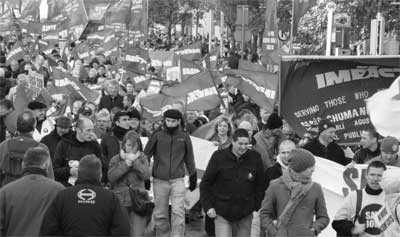 Andrew Flood’s article “Capitalist crisis and union resistance in Ireland” (IAR 1) calls for a “debate on where we should put our energy”. This is a contribution to that debate. Andrew outlines the framework of the economic crisis and the balance of forces as the Irish workers’ movement attempts to respond to attacks by the bosses and their state. While the exact details of the government’s December budget are currently unclear, doubtless it will once again involve a massive attack on the living standards of working people.
Andrew Flood’s article “Capitalist crisis and union resistance in Ireland” (IAR 1) calls for a “debate on where we should put our energy”. This is a contribution to that debate. Andrew outlines the framework of the economic crisis and the balance of forces as the Irish workers’ movement attempts to respond to attacks by the bosses and their state. While the exact details of the government’s December budget are currently unclear, doubtless it will once again involve a massive attack on the living standards of working people.
The scientific case against inequality - review of The Spirit Level
 We all want a better world, but is it possible? The recently published book The Spirit Level joins a growing body of evidence for the viability of a better world.
We all want a better world, but is it possible? The recently published book The Spirit Level joins a growing body of evidence for the viability of a better world.
Feminism in the Muslim World
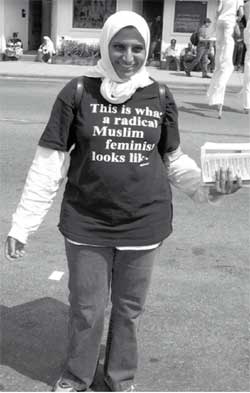 Sevinc Karaca, a Turkish anarchist and feminist, describes the fine line that Muslim women must navigate between Islam and the West. "In all Muslim countries, women had to wait until the 1970s and 1980s for a feminist movement that questioned the practise of religion and its role in the oppression of women. As Feminists in the West beat around the bush with an air of multi-culturalist political correctness and go out of their way to show respect for exotic religions, there is a growing number of feminists in countries like Turkey and Iran and among the diaspora in non- Muslim countries whose policies and strategies for feminism do not take the route of Western Liberal Feminism. The majority of feminist ideologies and activism in the developed world today do not address and support the struggle of their Muslim comrades openly, directly or sufficiently."
Sevinc Karaca, a Turkish anarchist and feminist, describes the fine line that Muslim women must navigate between Islam and the West. "In all Muslim countries, women had to wait until the 1970s and 1980s for a feminist movement that questioned the practise of religion and its role in the oppression of women. As Feminists in the West beat around the bush with an air of multi-culturalist political correctness and go out of their way to show respect for exotic religions, there is a growing number of feminists in countries like Turkey and Iran and among the diaspora in non- Muslim countries whose policies and strategies for feminism do not take the route of Western Liberal Feminism. The majority of feminist ideologies and activism in the developed world today do not address and support the struggle of their Muslim comrades openly, directly or sufficiently."
On women and ‘Liberation’ in Afghanistan
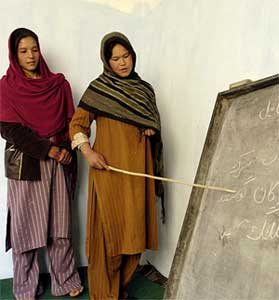 A decade ago the US First Lady Mrs. Bush’s went on the radio in the first solitary address of any president’s wife in U.S. history to dare all decent people of the world to join the US and its allies in freeing the women of Afghanistan from the “brutal terrorism” of Islamic fundamentalism. Almost ten years later this explanation continues, Time Magazine weighed in with its July 2010 headline, What Happens If We Leave Afghanistan. This story about ‘freeing’ Afghan women only became politically expedient when the aim of capturing Osama bin Laden and al-Qaeda proved harder to do than anticipated. So the Bush Administration asked Laura to polish off that erstwhile story of the savage East in need of an altruistic West, and they cleverly reinvented orientalism in the guise of “the woman question.”
A decade ago the US First Lady Mrs. Bush’s went on the radio in the first solitary address of any president’s wife in U.S. history to dare all decent people of the world to join the US and its allies in freeing the women of Afghanistan from the “brutal terrorism” of Islamic fundamentalism. Almost ten years later this explanation continues, Time Magazine weighed in with its July 2010 headline, What Happens If We Leave Afghanistan. This story about ‘freeing’ Afghan women only became politically expedient when the aim of capturing Osama bin Laden and al-Qaeda proved harder to do than anticipated. So the Bush Administration asked Laura to polish off that erstwhile story of the savage East in need of an altruistic West, and they cleverly reinvented orientalism in the guise of “the woman question.”
Solidarity with the European peoples in struggle! - Joint statement by the European Anarkismo organizations
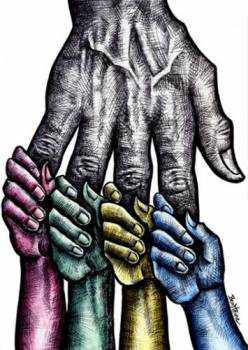 In recent weeks, the signs of anger among the peoples of Europe have been increasing: a general strike in Portugal, the huge September 29 strike in Spain, demonstrations of historic proportions in Ireland, the student movement in England, the enormous protests in Italy by factory workers and students and the growing mass movement against the privatization of water and, hopefully, the beginning of a lasting movement following the mobilizations over pension reforms in France. Though the slogans may vary from one country to the next, the revolt has the same origin: the peoples' refusal to pay for a crisis they did not cause, to have to put up with austerity measures by themselves, without the capitalists having to pay.The case of Ireland is emblematic - reduced social benefits, staff cuts in the public sector and cuts to public sector workers' pay, the extension of income tax to those who do not currently pay, the lowest-paid workers. But the government is not touching corporate tax, however, one of the lowest in Europe. The Irish people are refusing to bow down and tens of thousands of protesters took to the streets in late November.
In recent weeks, the signs of anger among the peoples of Europe have been increasing: a general strike in Portugal, the huge September 29 strike in Spain, demonstrations of historic proportions in Ireland, the student movement in England, the enormous protests in Italy by factory workers and students and the growing mass movement against the privatization of water and, hopefully, the beginning of a lasting movement following the mobilizations over pension reforms in France. Though the slogans may vary from one country to the next, the revolt has the same origin: the peoples' refusal to pay for a crisis they did not cause, to have to put up with austerity measures by themselves, without the capitalists having to pay.The case of Ireland is emblematic - reduced social benefits, staff cuts in the public sector and cuts to public sector workers' pay, the extension of income tax to those who do not currently pay, the lowest-paid workers. But the government is not touching corporate tax, however, one of the lowest in Europe. The Irish people are refusing to bow down and tens of thousands of protesters took to the streets in late November.
Wikileaks Cables: Harmless Gossip or Threat to World Stability?
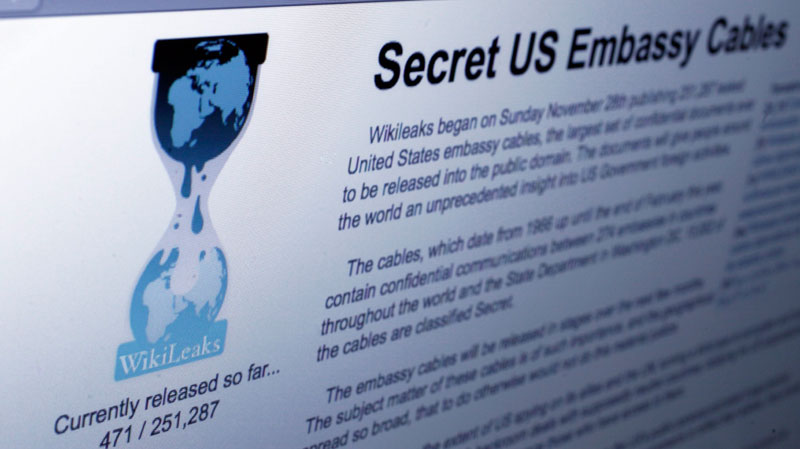 Wikileaks is currently making headlines daily. Aside from the various revelations, there are also two widely told stories which are suppose to help us put these leaks into context.
Wikileaks is currently making headlines daily. Aside from the various revelations, there are also two widely told stories which are suppose to help us put these leaks into context.
The first story is that the leaks are nothing more than gossip. They are stories about Gaddafi's nurse[1] and what the ambassador thinks of David Cameron[2]. Anyone who isn't a tabloid reader or nosey-parker should be disinterested in the content.
WikiLeaks and the Politics of Information
It is an uncommon pleasure to see the world’s politicians scuttling around furiously, much like woodlice uncovered by the lifting of a rock. WikiLeaks are the ones who did the lifting, and have exposed for us the working of US diplomacy; the information, intentions and concerns of the world’s dominant power.
Wikileaks comes to Ireland - The Shannon connection
.jpg)
The latest Wikileaks release of “diplomatic” communications has unearthed some new information about the US military's use of Shannon airport. Whilst the Irish government have always tried to downplay the role that Shannon airport plays in the mass murder of people of colour and the geopolitical power plays of the US and UK, it was clear in 2005, when this cable was written, that Shannon airport was a significant “stopover” for the US industrial-military complex
The Economist gives up on halting Climate Change
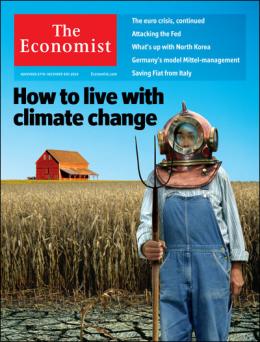 This weeks leads editorial in the international business magazine 'The Economist' shrugs its shoulders and walks away from the idea of controlling Climate Change. This is very significant for The Economist is not a climate change denial publication, for some time (at least as far back as 2006) it has accepted the scientific consensus that human caused Climate Change is a real process with extremely serious implications. So it giving up the fight is a very big deal indeed, and one that contains serious lessons for the Climate Change reformists who continue to believe that if enough pressure is put on a deal can somehow be struck at five minutes to midnight.
This weeks leads editorial in the international business magazine 'The Economist' shrugs its shoulders and walks away from the idea of controlling Climate Change. This is very significant for The Economist is not a climate change denial publication, for some time (at least as far back as 2006) it has accepted the scientific consensus that human caused Climate Change is a real process with extremely serious implications. So it giving up the fight is a very big deal indeed, and one that contains serious lessons for the Climate Change reformists who continue to believe that if enough pressure is put on a deal can somehow be struck at five minutes to midnight.

